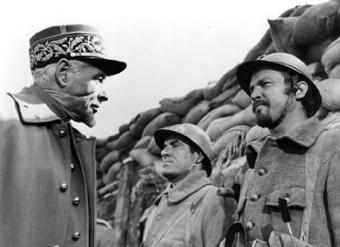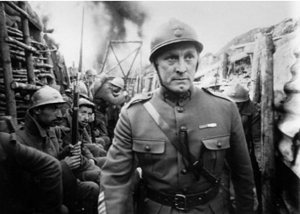
 |
|
|
|
The Criterion Collection has been releasing Stanley Kubrick films on video since the days of laserdisc, and now turns its attention to one of the director's early artistic successes. Kubrick's third feature The Killing had garnered critical attention but was still a small film with limited earning potential. Rather than remain in the B-picture ghetto, Kubrick and his producer James B. Harris assembled a package to attract a big star. Impressed by an obvious new talent, Kirk Douglas secured a production deal for 1957's Paths of Glory and the director was off and running again. Stanley Kubrick managed his career brilliantly. Many film directors opted for the security of studio contracts or retreated to television when feature work dried up. Others like Sam Peckinpah fought with their producers and were fired from their own films. Kubrick stayed independent and kept his focus on the long goal. Kirk Douglas claimed a third of Paths of Glory's budget as his salary, and Kubrick was practically working for free. Rather than swim upstream, the director gave Douglas what he wanted -- big Oscar-bait dramatic scenes -- and concentrated on the daunting challenge of making an intelligent anti-war film. The 1950s didn't really produce anti-war films as we now define them. War was Hell but it also delivered exciting entertainment, hopefully with a little sex to attract female audiences. Robert Aldrich's Attack! promised a raw indictment of a corrupt and cowardly chain of command, but finished up applauding the U.S. Army as a self-healing institution. Paths of Glory makes a searing statement about the callous inhumanity of World War 1, where millions of men were killed in suicidal charges against machine guns. Kubrick directs for maximum intellectual outrage at the plight of soldiers betrayed by a decadent and cynical officer corps. 
A lawyer in civilian life, Colonel Dax (Kirk Douglas) accepts orders to take an enemy position called The Anthill. On a reconnaissance patrol, the cowardly Lt. Roget (Wayne Morris) panics and kills one of his own men. He silences the only witness, Corporal Paris (Ralph Meeker) by pulling rank -- the enlisted man's word will never be accepted over his. The utterly unprincipled General Broulard (Adolphe Menjou) orders the incompetent, arrogant General Mireau (George Macready) to take The Anthill at all costs. The attack fails, after many of Colonel Dax's men are killed in a pointless frontal assault. Seeing that some soldiers never left the trenches, Mireau directs his own artillery to fire on them, but his orders are refused. To save face and "teach his men a lesson", the petulant Mireau demands that executions be carried out. The number of men to be shot is narrowed to just three, to be chosen by the trench officers. One victim is selected by lot and another is singled out because he's unpopular. Lt. Roget chooses the third to die: Corporal Paris, the witness to Roget's cowardice. Colonel Dax defends the three in the court-martial, despite the fact that the outcome is a foregone conclusion. General Mireau has equated his personal pride with the honor of the army. General Broulard sees the entire issue in political terms, and coldly assumes that Dax's spirited defense is a maneuver for personal advancement. But Broulard also lays a trap for Mireau ... as Dax has documented the General's attempt to fire on his own troops. Stanley Kubrick's Paths of Glory is a superb film about the failure of human effort and institutions. The theme is consistent in his work, from the robbers of The Killing to the spacemen in 2001 betrayed by their own computer. On a meager budget, Kubrick constructs an impressive, gritty battle scene that holds its own against the benchmark set by Lewis Milestone's classic All Quiet on the Western Front. Making good use of his photographic skills, Kubrick's vision of trench warfare resembles authentic photographs. The troops suffer and die in filthy conditions while the generals meet for lunch in regal chateaus. The ancient palaces are as much of a holdover from the decadent past as the antiquated military system itself. The taut screenplay deals almost exclusively in irony. Screenwriters Kubrick, Calder Willingham and pulp crime novelist Jim Thompson place the blame squarely on a grossly corrupt military command structure. General Mireau reserves the right to kill his own men because they aren't sufficiently willing to commit suicide. Loyal soldiers are used first as cannon fodder and then as scapegoats for the failed trench war. One of the men to be executed "for cowardice" is offered a blindfold by the very man that has condemned him to cover up his own cowardice. Another (Joe Turkel) is so sick that he must be awakened for his own execution. The killing is staged as a formal ritual, to proclaim its legitimacy. General Mireau considers the spectacle his personal vindication: "My men did die well, didn't they?" Thanks to Kubrick's masterful direction -- he refrains from overstating emotions already present in the material -- Paths of Glory is a devastating experience. We admire Cpl. Paris' calm acceptance of his fate -- the man has too much dignity to indulge in a pointless protest against the inevitable. The uncontrollable actor Timothy Carey wouldn't take direction and had to be fired from the film. He ends up as one of its most memorable assets, wailing and crying as he's led to the firing squad. Several key scenes take place between the generals as they discuss murdering their own men over a light meal. Kubrick's "cold" observance of their political games displays their vain posturing for exactly what it is. Kubrick also fulfills his mission to make Paths of Glory a vanity showcase for Kirk Douglas. Col. Dax hasn't got all that much to do with the story, as his legal defense of the three condemned men is little more than a noble gesture. But Douglas is in there sticking his chin out, heroically leading his troops on a charge through no-man's land. We also see Dax looking good without a shirt as he washes up. Dax's real function is to serve as a sounding board for the power games between Broulard and Mireau and to provide an identification figure for the audience, someone that can see through these high-ranking villains. When Col. Dax speaks up, however, the movie takes a quick plunge into socially conscious preaching. Kirk Douglas rails against injustice with all of his might. When the axe has fallen, he Stands Right Up and tells off the bad guys in no uncertain terms. If only history had more Colonel Daxes around when Galileo and Joan of Arc were on trial. These Big Scenes for the producer-star are also a sop to the audience. Don't worry, everybody may die but a noble hero will be there to make a fine speech. 
If not for Kubrick's superior direction, Paths of Glory might very well resemble a social pleading film by that other Stanley, Stanley Kramer. The producers risk little by protesting the injustice of a war already a half-century in the past. Since the story takes place in the French Army, the film isn't going to offend the Pentagon. The Production Code had nothing to complain about, as the combat isn't shown to gory excess and a soulful priest (Emile Meyer) is close at hand. The greater anti-war message remains abstract. Nothing here suggests that the film's moral outrage is applicable to present-day militarism. Audiences have always liked Kirk Douglas's grandstanding, as Col. Dax provides a handy outlet for our built-up rage. Mireau and Broulard's intolerable behavior cues cheers for Kirk's tirade, even when the actor performs his signature cracked-voice bit. But Kubrick immediately reclaims authorship of the film by following this scene with a surprise finish from left field. Like a leftover bit from Jean Renioir's Grand Illusion, we see a captured German girl (Suzanne Christian) goaded into singing for the troops. The soldiers' hoots and catcalls turn to tears as she sings a heartbreaking tune. Douglas's contribution to this scene is limited to a pair of brief cutaways. He's still the star, but the movie belongs to Stanley Kubrick. Criterion's Blu-ray of Paths of Glory restores the graphic power of the film's B&W imagery. Whether cruising through endless muddy trenches or regarding a 17th-century chateau with thirty-foot ceilings, Kubrick's visual control is complete. B&W on standard video just doesn't look this good, and the old MGM disc was a bit pale as well as given a full-frame transfer. Criterion's 1:66 matting frames the careful compositions precisely and restores the intimacy of close-ups. Disc producer Curtis Tsui's extras present a wealth of critical thought, even for viewers already familiar with the film. Gary Giddins' audio commentary discusses the production and its personalities in full detail. The movie was banned in France for a time, as can be easily understood. Kubrick is heard in a 1966 audio interview and Kirk Douglas talks about the picture in a 1979 television appearance. In Criterion's new interviews, producer Jan Harlan presents his impression of Stanley Kubrick, while Paths of Glory's refreshingly outspoken co-producer James B. Harris recounts the film's behind-the-scenes politics. Kubrick's widow Christiane recounts her experience being hired to act in the film while offering her own unique perspective on the director. A trailer is included, and the insert booklet contains a thorough essay by James Naremore. Of special interest is a French TV documentary on the legacy of the real-life WW1 incident that inspired the Humphrey Cobb book on which Paths of Glory is based. The descendants of the unjustly executed soldiers lobbied for decades to restore their honor. As it turns out, one of the historical victims was singled out because the first randomly chosen loser happened to be Jewish. After the scandal of the Dreyfus affair, political considerations intervened to force a second choice. That fact would seem to endorse Stanley Kubrick's ironic stance as totally in keeping with historical truth.
On a scale of Excellent, Good, Fair, and Poor,
Paths of Glory Blu-ray rates:
Reviews on the Savant main site have additional credits information and are often updated and annotated with reader input and graphics. Also, don't forget the 2010 Savant Wish List. T'was Ever Thus.
Review Staff | About DVD Talk | Newsletter Subscribe | Join DVD Talk Forum |
| ||||||||||||||||||